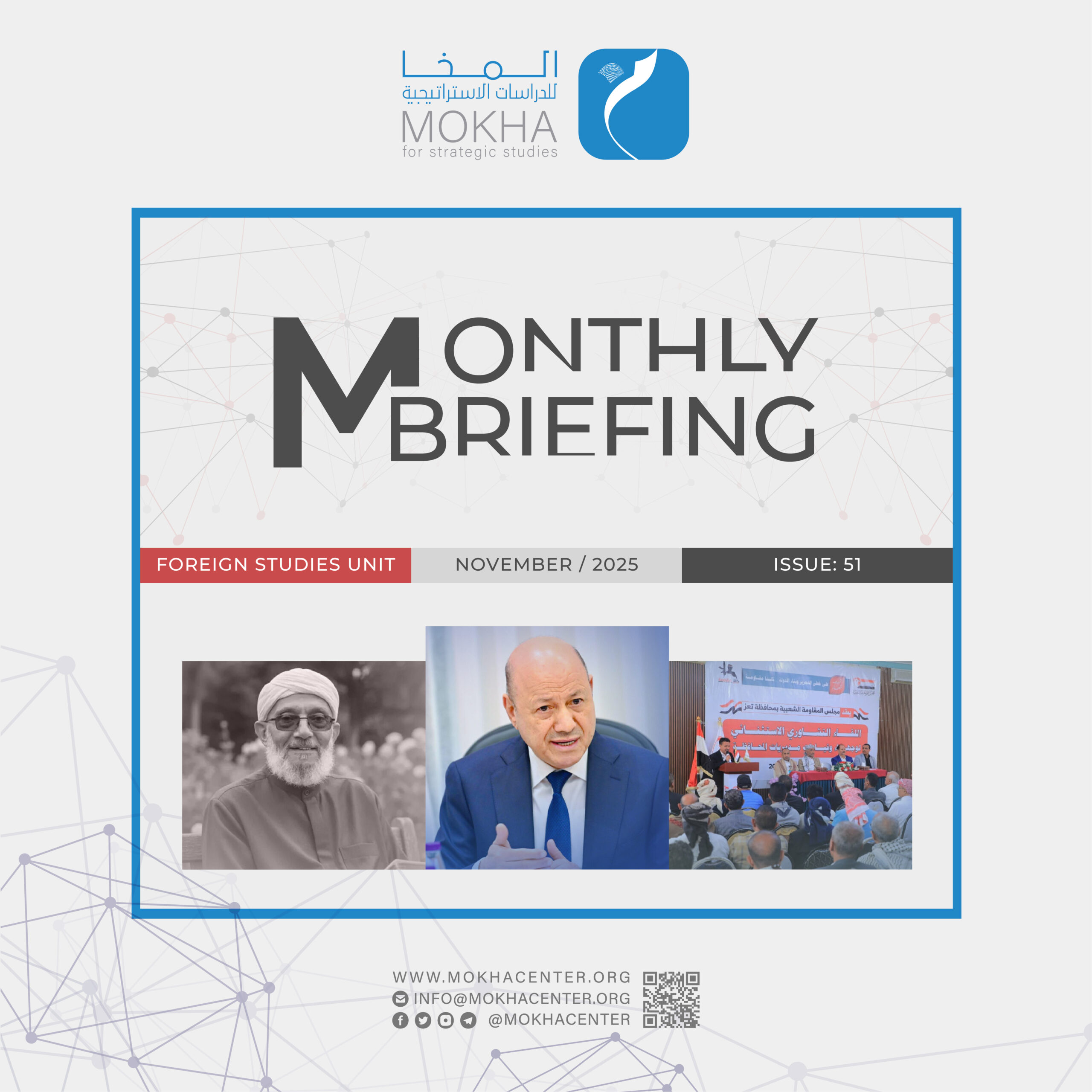Monthly Briefing/January – 2025

Political Scene:
January 2025 witnessed intensive international action toward the Yemeni crisis, with the United Nations focusing on political and economic aspects, while Western pressure, led by the United States, escalated through sanctions to confront the Houthis. Developments highlight the complexity of the situation, as the Houthi group continues its military escalation (with naval attacks), while the government insists on a political solution. Meanwhile, external interventions (Israel) further complicate the crisis, reflecting the difficulty of achieving stability amid ongoing divisions and conflicting regional and international sources.
- UN Envoy to Yemen Hans Grundberg concluded his visit to Sana’a, during which he had discussed with Houthi political and military leaders the renewal of the political peace process, de-escalation and fostering a conducive environment for dialogue. January 9
- After returning from a visit to Tehran, the UN Envoy to Yemen Hans Grundberg called on Yemeni parties to cooperate in resolving the economic crisis, emphasizing the importance of unifying the central bank, resuming oil exports and paying public sector salaries. January 15
- The Yemeni government reaffirmed its commitment to the three references for resolving the crisis with the Houthis during a meeting between the head of the legitimate government, Ahmed Awad bin Mubarak and UN Envoy Hans Grundberg. This came after UN efforts to revive the stalled political process, which included meetings with regional officials and Houthi leaders in Sana’a. January 15
- The United States called on the Houthis to stop targeting international shipping vessels in the Red Sea and the Gulf of Aden to avoid the “worst-case scenarios.” It also warned of the possibility of additional sanctions and cutting off their illicit revenues to ensure peace in Yemen. January 16
- UN Envoy to Yemen Hans Grundberg condemned attacks on civilian infrastructure after Israel launched intensive air strikes on Yemen, targeting Hodeidah Port and Sana’a Airport, which disrupted the unloading of humanitarian aid. January 16
- Presidential Leadership Council Chairman Dr. Rashad Al-Alimi directed the government to cooperate with the central bank and the international community in implementing sanctions against the Houthi group, which has been designated as a “terrorist organization” as per the new U.S. administration’s decision. January 22
- The White House announced the re-designation of the Houthi group as a “foreign terrorist organization” by President Donald Trump, reversing a decision by the previous U.S. administration, in an effort to cut off their resources and end their attacks on maritime shipping. January 23
The United Nations suspended its operations in Houthi-controlled areas after more of its staff were detained, stating that the suspension will remain in effect until further notice. January 24
Military Scene:
January witnessed a military escalation on multiple fronts, with intensified American, British and Israeli air strikes targeting Houthi positions. Ground clashes also escalated in Taiz and Ma’rib, where government forces inflicted significant losses on the Houthi militia. Meanwhile, the group sought to exploit the truce while continuing mutual attacks despite international pressure through sanctions and its designation as a “terrorist organization.” This reflects the complexity of the situation and the divergent strategies of the actors involved in the Yemen conflict.
- American and British warplanes launched air strikes on Houthi military sites east of Saada province, just hours after the Israeli military announced the interception of a missile launched from Yemen, for which the group claimed responsibility. January 5
- Israel, in coordination with the “International Coalition,” carried out extensive air strikes, using 20 aircraft and dropped 50 high-explosive bombs targeting Houthi sites in Sana’a and Hodeidah. According to an official statement, the strikes targeted warehouses containing the group’s missiles and drones. January 10
- The United States and Saudi Arabia held discussions with Yemen on strengthening security cooperation and countering the Houthi escalation in the Red Sea. The U.S. Central Command chief, General Michael Kurilla, met with his Saudi and Yemeni counterparts to discuss joint security issues, military training, countering regional threats and promoting stability and peace. January 12
- The Houthi group announced an attack on the U.S. aircraft carrier USS Harry S. Truman in the Red Sea using missiles and drones — marking it as the sixth attack on the vessel within a month. However, a U.S. official confirmed that neither the ship nor its personnel sustained any damage. January 15
- Various clashes erupted between government forces and the Houthi militia in Taiz, Ma’rib and Al-Jawf. The National Army also foiled infiltration attempts in Taiz, inflicting losses on the Houthis, who admitted to the deaths of six of their fighters. January 22
Government forces thwarted new attacks launched by the Houthi militia in Taiz and Abyan provinces. They also managed to shoot down a reconnaissance drone belonging to the group in the Al-Dabab area, south of Taiz. January 23
Security Scene:
American-Israeli strikes targeted multiple sites in Houthi-controlled areas, while Aden faces internal challenges following revelations about assassination cases implicating regional actors (e.g., the UAE).
- Israel’s public broadcasting authority reported that 12 people were injured while rushing to shelters, and nine others suffered panic-related injuries after a Houthi-launched missile penetrated toward Tel Aviv. January 3
- The U.S. Department of Defense transferred 11 Yemeni detainees from Guantanamo Bay to Oman, reducing the number of remaining detainees to 15. Included in that group of 11 were Ali Sharqawi Al-Hajj and Abdul Salam Al-Hilah, who were finally released after years of detention and torture. January 7
- Aden’s Special Criminal Court held its 15th session in the trial of assassination cells involved in the killings of political, military and religious figures. Defendant Imad Abdulwahid confessed that the group received orders from National Security leaders and Emirati officials. January 8
- U.S. Central Command chief, General Michael “Erik” Kurilla, discussed security cooperation strategies and enhancing operational capabilities of Yemeni forces with Yemen’s Chief of Staff, Lt. Gen. Sagheer Hammoud bin Aziz. January 12
- The U.S. Treasury Department imposed sanctions on the Yemen and Kuwait Bank for Trade and Investment, accusing it of financially supporting the Houthis through Iran’s Quds Force. The bank denied the allegations. January 17
- Aden’s Public Prosecution arrested the director of Al-Nada Company’s branch and a criminal investigation officer on charges of forgery and attempting to smuggle advanced communication equipment to the Houthis. January 18
Aden’s Public Prosecution presented new evidence against Antar Kardoom and others, including a video confession from a suspect involved in assassinations. The court postponed the session to summon witnesses from Bir Ahmed Prison, which is overseen by the UAE. January 28
Economic Scene
- The Yemeni rial plummeted to record lows against foreign currencies in government-controlled areas, with the exchange rate reaching 2,163 rials per U.S. dollar and 565 rials per Saudi riyal, despite a $300 million Saudi financial aid package to the Central Bank. January 13
- The Yemen and Kuwait Bank denied financing any political entity outside legal frameworks, asserting that U.S. sanctions against it were politically motivated and would not impact its financial standing. January 18
The Yemeni government requested $1 billion in financial assistance from the International Monetary Fund (IMF) to implement reforms, including tax hikes, subsidy cuts on fuel, water and electricity services. Meetings were held with IMF officials in Washington and Amman, amid warnings about the potential impact of these measures on living conditions. January 24
Violations
Houthi violations against civilians are escalating, with landmines mutilating civilian bodies, alongside mass abductions in Saada and the kidnapping of former diplomatic staff in Sana’a. The Houthis are also conducting ethnic cleansing campaigns, such as in Al-Bayda. The political trials of journalist Al-Meyahi highlight how the judiciary is being used by the Houthis as a tool of repression, while efforts to release 815 detainees remain stalled. Meanwhile, crises (such as the release of 153 detainees by the Red Cross) are being exploited as bargaining chips, complicating the pursuit of justice and further legitimizing violations.
- The United Nations Mission in Hodeidah reported seven landmine explosions in December, resulting in the deaths of six people and the injury of seven others, including children. These incidents occurred in the Al-Hali, Al-Durayhimi and Al-Hawk districts. The Houthi group has planted tens of thousands of mines across all the provinces it has advanced into, often without maps, causing numerous civilian casualties. January 5
- The Houthi group carried out a large-scale abduction campaign in Saada province, targeting 300 civilians, including 50 women, accusing them of espionage for foreign countries. January 7
- The Houthi group launched a new abduction campaign in Sana’a, targeting 15 individuals, including former Yemeni employees who worked in foreign and Arab embassies, including the U.S. embassy. This coincided with the visit of UN Special Envoy Hans Grundberg to Sana’a. January 10
- The Abductees’ Mothers Association condemned the continued crimes of abductions and enforced disappearances affecting 815 detainees and 164 enforced disappearances, including women and activists, in Houthi-controlled areas. January 14
- The United Nations Mission reported the death and injury of 93 civilians, including women and children, due to landmine explosions in Hodeidah in 2024, despite that being half the number of incidents that occurred in 2023. The mission confirmed the ongoing impact of explosive remnants on the Yemeni community. January 15
The International Committee of the Red Cross (ICRC) released 153 detainees in Sana’a, who had been held by the Houthi group due to the ongoing conflict. The ICRC affirmed its support for ensuring humane treatment and conducted individual interviews with the detainees to document their identities and assess their health conditions. January 25
Humanitarian scene
- A recent report by global network Mixed Migration Center (MMC) revealed that more than one million African migrants have crossed into Yemen over the past decade via a perilous route extending from the Horn of Africa to the Gulf states. January 14
Twenty Ethiopian migrants lost their lives after their boat capsized off the coast of Dhubab District, Taiz Governorate, due to strong winds. The boat was carrying 35 migrants along with a Yemeni crew. January 21

